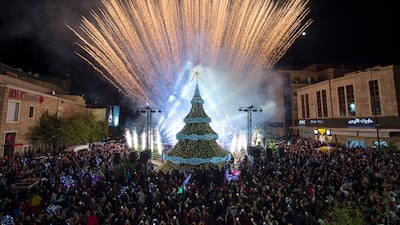This year in Lebanon, hope and perseverance are symbolised by a Christmas tree.
The holidays in Byblos are a dazzling sight, despite the country entering the fourth year of a financial crisis that has paralysed state institutions, caused basic services to collapse and impoverished most of the population.
For the second year in a row, the ancient city of Byblos — known for its extravagant Christmas festivities — inaugurated the holiday season with its famous tree-lighting ceremony.
Christmas tree lifts Lebanese spirits in Byblos - video
“It’s always a magnificent sight,” said Namir Abdel Qader, a university student and resident of Byblos.
Although they are not Christian, Namir and her family attend the lighting ceremony every year.
“It’s famous. People from all over the country wait for it.”
A marching band in red suits and Santa hats opened the ceremony, playing a mix of Christmas music accompanied by the traditional derbake, or Arabic drum. A dance performance followed.
When the Christmas tree was lit following a countdown, fireworks erupted overhead.
For most, the lighting ceremony was a comforting break from the worries of daily life amid political and economic instability, and a signal of better times ahead.
In 2020, the city could not afford to display a Christmas tree due to the prolonged economic crisis, compounded by the Covid-19 pandemic.
The next year saw its return, but this year — with political paralysis preventing even the most basic of economic reforms and the trajectory of Lebanon’s future uncertain — many residents worried the tree would not make an appearance.
The tree’s resurrection on Friday assuaged those concerns.
“It’s smaller than previous years,” said Mariam, who attended the tree-lighting ceremony with her husband and four children. “But its presence here … it tells us everything will be OK.”
But she added: “If you came to Byblos four or five years ago, before the economic crisis — the tree was even better.”
Her son Joseph chimed in, saying: “I’m glad they put it up this year during such a difficult situation, even though it’s small.”
The lighting ceremony was accompanied by a Christmas market, similar to others set up throughout the country. Stalls brimmed with food and crafts, toy salesmen distributed balloon animals, and dancers performed on stage.
For the average person, the event was an inexpensive, wholesome family-friendly activity in a country where care-free fun has become a rarity.
But authorities hope to leverage the holiday season to draw tourism to the struggling country, which relies on remittances and tourism income from its extensive diaspora.
Byblos has always attracted visitors during the holidays, but the tourism sector was hit hard by Lebanon’s financial collapse and by successive lockdowns during the Covid-19 pandemic.
“The prospect of tourism during these difficult days ahead will give us so much hope,” Lebanon’s caretaker tourism minister Walid Nassar told the crowd of hundreds gathered for the ceremony.
Wissam Zaarour, mayor of the Byblos municipality, told those assembled that he wanted the city to focus on better days.
“We hope to shed light on the positive things in Lebanon, because that will reflect positively on our tourism.”






